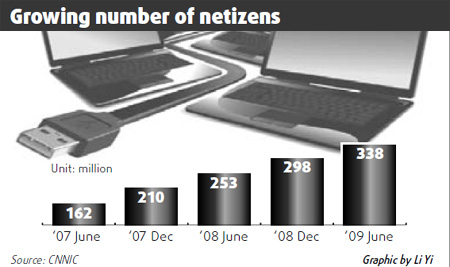
|
BIZCHINA> Top Biz News
 |
|
IWOM opens new vistas for companies
By Wang Xing (China Daily)
Updated: 2009-08-04 08:12
With China surpassing the United States as the world's largest online population, the Internet is fast becoming the source for consumers to search information and share experiences and also making online comments a vital indicator for the success of a company's product or services. Scenting the opportunities, many Chinese companies are now trying to collect and analyze consumer opinion in places such as blogs, bulletin board service (BBS), and social networking sites, hoping to profit from the buzz of hundreds of millions of Chinese online users. Michael Yang, chief executive of Mediacom, a domestic online public relations firm, said his company has launched a new service that could monitor and analyze online comments of Chinese Internet users by sifting through personal blogs, chatrooms, BBS and online news reports. The service, launched earlier this year, has attracted many customers, including firms like Hewlett-Packard, Intel and Samsung. "The purchasing habits of consumers have changed drastically in recent years as the Internet has become a major tool for searching information and sharing experiences," said Yang. "But few companies know exactly what consumers are saying about their products online." He said his company's new service could help companies collect consumer feedback on the Internet and help improve their products and services. He said the service now brings in revenue to the tune of 500,000 yuan every month and is slated to touch 25.62 million yuan annually by 2010. According to figures from CNNIC, China had 338 million online users by the first half of this year, an increase of 13.4 percent over 2008. Among them, 78.5 percent of netizens share knowledge online. CIC, China's first research and consulting firm on consumers' online opinions, refers the text and multimedia content related to companies, products or services shared by netizens as the Internet World of Mouth (IWOM). "Compared to the West, IWOM is more developed in China," said Sam Flemming, the co-founder and CEO of CIC. "There are more people online, more netizens talking online, more places to connect and netizens are overall more active." According to a report by CIC, 81.2 percent of BBS or blog users in China search IWOM before making a purchase. In categories as mobile phones, consumer electronics, cosmetics and baby care products, at least half of the respondents surveyed seek out IWOM when looking to purchase a product. Although some companies such as Nike and Pepsi have some of the most successful IWOM strategies, Flemming said advertisers still don't understand IWOM very well. He said while China has a more developed IWOM ecosystem than the West, IWOM marketing is less developed. However, Yang from Mediacom said more companies in China are starting to realize the importance of IWOM and he estimated the IWOM market turnover in China to reach 1.5 billion yuan this year. Many local government organizations are also interested in what people are saying online, Yang said, noting that his company has joined the World of Mouth Marketing Association in the United States and is incorporating its online public relationship service into the new analysis system.
The company last month released a system that specifically analyzes online game players' comments on games, which Qu said has proved to be extremely popular with Chinese online gaming companies. "The Internet is developing so fast that users' online comments can now boost or hurt product sales," said Qu, noting that companies need more in-depth analysis of what consumers are saying online. Flemming said the real challenge of the IWOM market is how to "make sense of the buzz" for strategic planning. "Clients don't need more data, they need more insight and implications for better marketing," he said.
 (For more biz stories, please visit Industries)
|
||||||